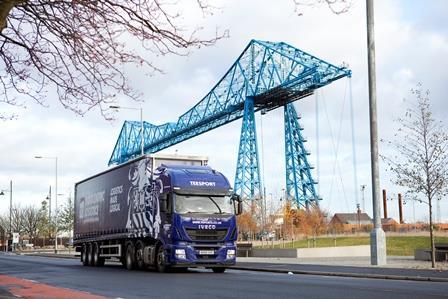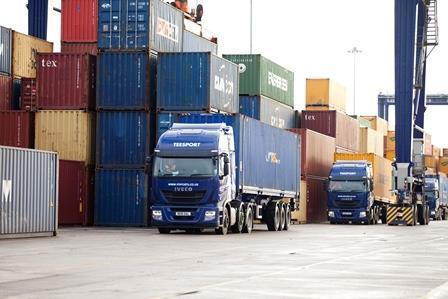
The idea of port-centric logistics – where imports are handled close to the port of entry and sent direct to their destination rather than via a central DC – has been given a boost by developments such as London Gateway and Liverpool2.
But PD Ports has had the largest retailer-backed portcentric logistics park in the UK, with 3 million ft2 of warehousing, a fleet of 68 trucks, 250 trailers and 420 employees – of which 90 are drivers - for over 10 years. Jim French is PD Ports’ director of portcentric logistics, and the immediate past national chairman of the RHA.
On a boat tour of Teesside, which included getting a good view of the 27 huge offshore wind turbines in the Tees estuary, French explained that Teesport was undergoing a major redevelopment following the closure of the former SSI steel works.
“Teesport went through a big change when it lost the steel and the associated coal and iron ore imports,” he says. “It's diversified, and now handles a lot of agricultural products especially grain. It has two container quays [dubbed the Northern Gateway] where volumes are increasing year-on-year, and there is a ro-ro facility from where P&O runs a freight-only service to Zeebrugge and Rotterdam. It's also got a fertiliser export terminal.”
NFC alumnus
French is “a trucks and sheds man” through and through. He started with BRS in Birmingham straight from school before moving on to Exel Logistics, and worked for some of the doyens of the NFC including Robbie Burns, Steve Abel and Gerry Brown.
“I worked for Exel in different parts of the country right up until 1997,” French says. “It was an exciting time particularly at the start of the 1980s when contract logistics was booming. I was very much involved at Cowley in Oxford, which was then a JIT [just in time] warehouse feeding the car plant.” Originally founded in 1913 by William Morris, Cowley is now known as Plant Oxford and assembles BMW Minis, but in the 1980s it was making Rover cars in association with Honda.
“They'd been to Japan and seen how they made cars there and said ‘this is the way we've got to go’,” says French. “When I eventually left there I went to work in Doncaster for Unipart with Martyn Pellew, who had been Robbie Burns' marketing and development director at Exel. He came up with the idea of using logistics as a commercial term - previously it was really a military term.”
After six months French was approached by another Exel alumnus Ian Veitch to go to work for him at UCI, which then became NYK and later Yusen Logistics. “I did that for five years, and then in 2003 Graham Roberts, who had previously been an NFC board member, became the chief executive here and he asked me if I would like to join PD Ports.”

PD Ports logistics services was an amalgamation of three small hauliers based in Billingham near Middlesbrough, Scunthorpe and Felixstowe. “I had the role of pulling them together as one logistics operation,” says French. “PD Ports had bought the port which had been run by the Tees and Hartlepool port Authority. When Graham Roberts took over he set up four divisions: the first was Teesport, second was port services and third was logistics. The fourth was a Mercedes dealer centred on Immingham which was later sold off.”
Each operating centre inherited clients based at the local port, so the workload was “very fragmented” says French. “Scunthorpe was all about working for Corus and then Tata Steel, and we were doing a lot of site services work as well as transport,” he says. “Felixstowe was containers, storing them, unstuffing them and delivering the contents of around 300 boxes a week. We have over 500,000ft2 of warehousing there, making us the largest 3PL at the port, and Freightliner runs daily container trains from Felixstowe to Teesport. Billingham was steel and chemicals, and we still have over 300,000 ft2 of warehousing there. It recently picked up the tea contract from Taylors of Harrogate.”
Big boxes
Teesport can accept Panamax vessels - the biggest ships that can pass through the Panama Canal, around 65,000 tonnes or 5,000 TEU – which is small beer compared with Felixstowe, which earlier this year welcomed the world’s largest container ship, capable of carrying up to 20,000 TEU.
But French says the port’s capacity can be expanded using the former steelworks facility.
“The bulk terminal that was used for the steel works has some of the deepest water and longest quays in the UK,” he says. “PD Ports has spent £50m redeveloping one dock to handle bulk and general cargo such as steel slabs. There is still lots of potential, including a large area of land for industrial development. Teesport sits bang in the centre of this 4,500 acre site, which is being managed by the South Tees Development Corporation.”
Teesport is home to EDF’s maintenance and operations hub that services the growing number of offshore wind turbines on the east coast, and is also at the forefront of other green technology. It is being used to import 1m tonnes of wood pellets a year for the generation of carbon neutral electricity at a new biomass power plant being built on the site of former steel works. It also has a liquefied natural gas (LNG) terminal for the import of this lower emissions alternative to diesel and coal.

While the mega container ships coming from the Far East are unlikely to switch from the southern ports to Teesport, Tesco and Asda both have large DCs on Teesside. Tesco’s DC is a high-bay facility that distributes slow-moving general merchandise and seasonal products nationally to RDCs for delivery to stores.
“A lot of Teesport’s shipping traffic comes from the Baltics, Russia and Spain,” says French. “Last year the supermarkets reckoned they'd saved over a million road miles by bringing product into Teesport as rather than it going through Southampton.
“Asda used to transport product from Southampton by road up to Wakefield. Their DC on Teesport is 360,000ft2 and now the containers come through here. Obviously it's cheaper to move boxes by sea than by road. It comes into the warehouse on the port and then they send it out into their distribution network. The benefit is that land is cheaper here and labour far more available than if they were going to put another warehouse in the golden triangle.
“And taking Taylors as an example, they used to bring containers of tea into Felixstowe. Most of the big vessels will either drop off at Felixstowe, Rotterdam or Antwerp and then smaller feeder vessels will run the containers to smaller ports. All Taylors’ tea now comes into Teesport on a feeder vessel.”
PD Ports estimates that its customers save 8m road miles and £15m in costs every year by using portcentric logistics.
Evolving landscape
The changing industrial landscape on Teesside has meant that Teesport has had to evolve as has the services the business provides to ensure it remains competitive and agile.
“There are a lot of developments going on that are not the traditional heavy industries,” says French. “It is growing in agricultural products and we've gradually moved transport and warehousing to be more centred on the port and to be able to provide a one-stop solution.”
In his two-year term as RHA national chairman, French made a priority of promoting initiatives to attract young people into the sector, such as the RHA’s Love the Lorry campaign. “To my mind, that’s the biggest issue facing the industry going forward,” he says. “It's not easily solved because there's so much competition from other sectors looking for skilled people.”
He worries that the skills crisis will only get worse as the UK heads towards Brexit, as truck drivers and warehouse staff are unlikely to be placed on the list of reserved occupations that will be high priorities for migrant workers. This would make it impossible to fill those roles with workers currently residing within the EU.
French is a strong supporter of High Tide, a foundation that helps young people enter the world of work, and Think Logistics, a scheme to get hauliers to promote the logistics industry to local school children. Last year he was named Volunteer of the Year by Career Ready, a charity that works closely with Think Logistics.
The logistics division has just taken on a warehouse apprentice working in the Taylors tea DC through the local Logistics Academy, which French was instrumental in establishing along with Stockton Riverside College. PD Ports is also working on recruiting a driver apprentice but French complains about the “bureaucracy” involved in establishing HGV driver apprenticeships under the Trailblazer apprenticeship scheme. Without this approval it is impossible to fund these apprenticeships with money raised from the Apprenticeship Levy.

The Academy sends young people on four-week internships with local logistics companies in the summer months and finds each student a senior mentor to help develop their careers.
French mentored Alice Briggs, a student of engineering at NETA (formerly the North East Training Association) which is a part of Stockton Riverside. Briggs applied to come on the Logistics Academy which was the Career Ready programme connected with the Think Logistics initiative.
“I mentored Alice during the first year and at the end of the year she gained an apprenticeship with an engineering company in Billingham,” says French, who is chairman of the local advisory board for the Logistics Academy at the college. “I have had a wonderful career in logistics and want to put something back by getting more young people into the industry.”













